Looking for Online Masters in History No GRE programs for 2024? Get your online history masters degree with no GRE required!
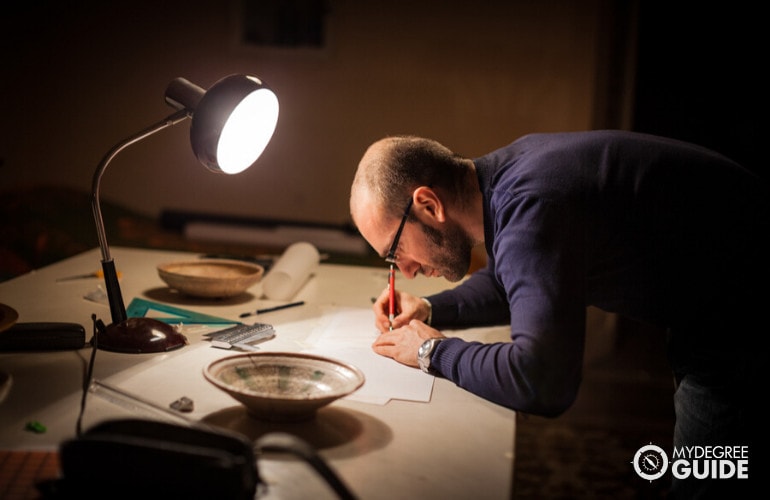
Humanity has a rich history. As a historian, you’ll have many opportunities to explore the past people, artifacts, and events that have shaped our modern world.
Editorial Listing ShortCode:
To gain valuable scholarship and research skills and learn how to teach others about history, enroll in an online history master’s degree program.
Curriculum for History Masters Programs

What will you learn during your grad studies? That depends on your school’s curriculum. While master’s programs often have many similar classes, history is a broad field, and courses can vary significantly from school to school. You may come across classes like the following.
- American History: Learn about the founding of the United States and major developments through modern times.
- Archival Systems: Talk about ways to preserve historical artifacts and documents and learn about the value of digital systems.
- European History: Survey events and developments throughout European history and learn to think about them within a global context.
- Historical Methods: Explore ways that historians study history and learn to evaluate the validity of various sources.
- Historical Theory: Discuss the ways that people have approached history throughout the years and consider how and why those views have changed over time.
- Historical Writing: Study methods of writing about history and explore the effects that written works have on people’s understanding of history.
- Teaching History: Gain a theoretical understanding of the reasons to teach history, and explore approaches to curriculum and instruction. Then, receive opportunities to try your hand at teaching.
- World History: Through discussions and primary source readings, learn about developments in parts of the world outside Europe and the United States.
Before enrolling, explore a school’s curriculum to make sure it’s a good fit for you and your career goals. Remember that selecting electives may allow you to customize your studies.
Online History Masters Degree Concentrations

Just as your class selections play a significant role in the topics that you’ll cover during online masters programs in history, the concentration you choose can also be quite influential.
Editorial Listing ShortCode:
By selecting a concentration, you’ll have opportunities to take classes that are focused around a specific topic or time period, and you can prepare for a career that interests you.
American History
With an online masters in american history, you can study periods like colonization, the Civil War, and the Cold War as you work toward becoming an expert in this field of history.
Although you’ve surely learned about these time periods before, evaluating them in light of the most recent scholarship may challenge some of your long-held views about the course of events. After graduation, you might become a teacher, a preservation officer or an economist.
European History

In this concentration, you can explore the long history of Europeans peoples and nations, and you can discuss how European history fits into the larger context of world history.
You may focus your studies on a particular time period, such as the Renaissance. This degree can be useful for educators, curators, sociologists, or researchers.
History Instruction
If you want to inspire students to love and appreciate history or make new historical discoveries, then a career as a secondary or postsecondary teacher may be for you.
To prepare, you’ll need to learn about instructional methods and social studies curriculum. For some work settings, you’ll need to have a teaching certificate, which may require additional studies.
Labor Movements

When you focus your history studies on labor movements that have occurred at various times and places, the curriculum may include classes like History of Labor, Race Issues in American History, the Progressive Era, and Gender Studies in History.
Editorial Listing ShortCode:
This could be a useful concentration for sociologists, researchers, and lobbyists.
Public History
As you learn about archiving, creating documentaries, and curating, you can develop the skills to make history come alive for people. Your classes may include Fundamentals of Public History and Digital Preservation.
Public historians often work as educators, archivists, curators, and preservation officers.
Women’s Studies

In classes like Feminist Theories, Human Rights, Sexuality in Ancient Times, and Women’s Literature, you can study the roles and rights of women throughout history. You may take classes alongside students from art, political science, or literature disciplines.
This concentration may help you prepare to become a sociologist, a researcher, an anthropologist, a political scientist, or a public official.
World Military History
Although your daily life may be heavily influenced by developments that have taken place in European and American history, global history is just as important.
For this concentration, you may take classes like Chinese Military History and Fall of the Russian Monarchy. Career options for graduates with this history degree online may include being a teacher, a writer, a sociologist or a museum curator.
History Salary & Job Growth
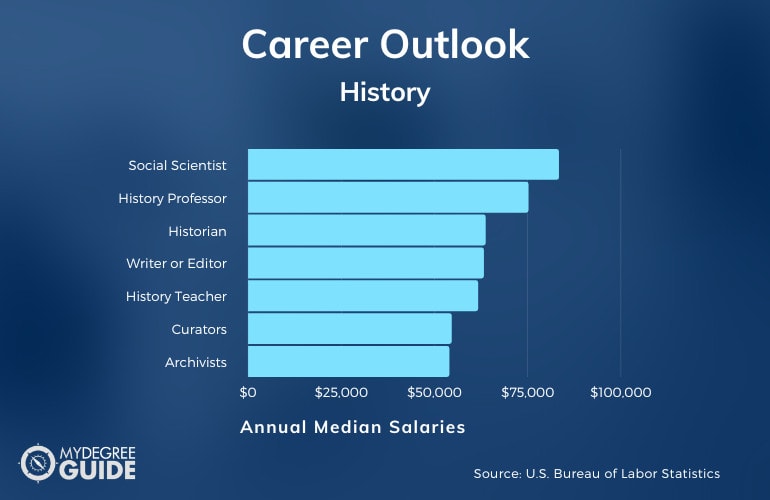
Jobs for historians are expected to grow at a 3% rate over the next 10 years. That’s about as fast as the national growth average for all industries.
Editorial Listing ShortCode:
Some positions that appeal to history students may grow at a faster rate. For example, there’s an 11% growth rate expected for archivists and curators, and positions for postsecondary teachers are rising at an 9% rate.
According to the Bureau of Labor Statistics, some careers in the history field include:
- Archivist, curator, or museum worker: With a job in this field, you can save artifacts and display them for others to see. Archivists work hard to preserve important objects and documents; curators build collections of noteworthy items. Museum workers may care for items, create displays or share exhibits with visitors. Archivists earn an average salary fo about $53,950 each year, curators earn around $54,570 on average each year, and other museum workers may bring home an average annual salary of $44,430.
- Historian: This job category covers a wide variety of people who work in the field of history. You might be considered a historian if you evaluate the authenticity of objects or documents, work in a museum, conduct research, lead tours, or serve as a consultant on historical topics. The average salary for historians is $63,680. Many historians hold government positions, and those with federal jobs are likely to make more than state or local historians.
- History professor: You may be able to teach at the college level after obtaining your master’s degree. In this role, you may work as both an educator and a researcher. Keep in mind that many schools prefer to hire faculty with doctoral degrees, but completing a master’s program can help you reach the goal of obtaining a terminal degree. The median salary for postsecondary history teachers is $75,170 annually.
- History teacher: At the junior high and high school levels, students start taking more social studies and history classes. With a history degree, you can be equipped to help teens build their interest in civics, history, and the world around them. To teach in most school districts, you will need to have a state teaching certificate. The average high school teacher earns an annual salary of $61,660.
- Social scientist: This broad category encompasses people who specialize in studying the structure of societies and the interactions between people or groups. If you are a sociologist, an anthropologist, an economist, a geographer, an archaeologist, a genealogist, or a political scientist, you could be considered a social scientist. A degree in history could be beneficial for any of those lines of work. The median annual salary of social scientists is $83,330.
- Writer or editor: To help others learn more about history-related topics, you could produce publications. Writers create the content for books, articles and websites, and editors review that content for grammatical and factual correctness. You could focus on publications for children, students, amateur history buffs, or professional historians. Writers and editors earn an average salary of $63,200 per year.
Salaries may increase with experience, and pay rates vary throughout the country. For example, as a social scientist, you might make $110,660 annually in Washington D.C.; $90,540 in Atlanta, Georgia; or $63,010 in Durham, North Carolina.
History Certifications and Licenses

To work as a historian, you don’t typically need any specific licensure. Even still, participating in educational programs can increase your professional skills and improve your marketability.
- Archival Certification: Demonstrate that you have the expertise to properly care for, store, and organize historical papers, records, and other documents.
- Small Museum Pro! Certification: Increase your knowledge about industry standards for museum collections and exhibition, and gain valuable leadership and administrative skills.
Keep in mind that separate licensure may be required for some jobs, such as teaching history in a K-12 school.
Professional Organizations for Historians

As a historian, you can benefit from networking and collaborating with others in your field. You can begin to build those connections now by enrolling in a professional organization during your master’s program.
- American Association for State and Local History: For those who preserve history in their communities, AASLH provides ideas, education, and support. Members often work at historical societies, museums, or heritage sites, and both vocational and volunteer historians are welcome.
- American Historical Association: AHA advocates for history education and awareness and promotes the development of multicultural views among historians. The organization issues multiple publications each year.
- National Council for History Education: NCHE is dedicated to those who teach history or are students of the discipline. The organization’s scope includes educators at the elementary, secondary, and postsecondary levels.
- National Council on Public History: Membership in NCPH is for anyone who helps the public increase their understanding of history. This can include archivists, government historians, documentarians, museum administrators, and others.
- Organization of American Historians: For those who conduct historical research, teach history to others, and care for documents and artifacts, the OAH provides advocacy, continuing education, and professional standards.
- World History Association: The WHA strives to promote diverse viewpoints and global awareness in the study of history. Members include researchers, educators, and others.
As an organization member, you may receive access to industry publications, online communities, annual conferences, educational resources, professional grants, job-posting boards, and helpful discounts.
Masters Degree in History Accreditation

Reputable schools that offer master’s degrees in history typically hold accreditation from one of the country’s regional accrediting associations.
These groups are:
- Higher Learning Commission (HLC)
- Middle States Commission on Higher Education (MSCHE)
- New England Commission of Higher Education (NECHE)
- Northwest Commission on Colleges and Universities (NWCCU)
- Southern Association of Colleges and Schools Commission on Colleges (SACSCOC)
- WASC Senior College and University Commission (WSCUC)
Regional accreditation is important because it confirms that the college maintains high academic standards throughout its programs. As a result, you’ll usually have better luck transferring credits from a regionally accredited school than an unaccredited one. Accreditation can also help you qualify for financial aid or land a good job.
Editorial Listing ShortCode:
When it comes to history degrees, you don’t need to look for programmatic accreditation from organizations in the field. Just be sure to select a school with regional accreditation, and you’ll be in good shape.
Financial Aid
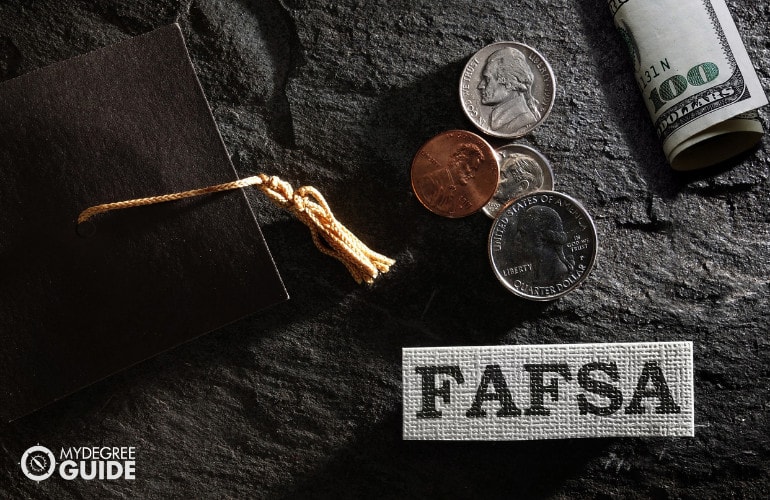
Even as a master’s student, you still have plenty of financial aid opportunities available to you. Look to:
- Federal government for grants and loans
- State government for grants
- Universities and private organizations for scholarships
- Employers for tuition assistance
Every little bit helps, and if you look hard enough, you can find plenty of potential sources to help fund your education.
Frequently Asked Questions

Here are a few more questions you might be wondering about.
Can You Get an Online Master’s Degree with No GRE?
Submitting test scores isn’t a requirement for all history master’s programs. Many schools focus on admissions requirements like essays and reference letters instead.
Editorial Listing ShortCode:
Studying for the GRE requires a major time commitment, so selecting a no GRE grad school may allow you to speed up your start date by a year or more.
How Long Does It Take to Get an Online Masters in History?

The average length of an MA History online is two years. With full-time enrollment in an accelerated history degree program, you may get done in closer to a year. On the other hand, some students opt to go at a slower pace and be in grad school for about three years.
Programs with intensive fieldwork or thesis requirements may be more likely to take over two years.
Will this Degree Provide Me with the Skills I Need to Advance My Career?
In school, you can increase your skills in thinking critically about history, performing scholarly research, and writing or teaching about history. This expertise can give you a competitive edge during a job search. The leadership skills you gain may help you move into supervisory or administrative roles with higher pay.
Do I Need Previous Work Experience to Get into an Online Masters Program in History?

Most history programs accept applicants who are new to the field. This makes a history program a good option for those who want to enroll in grad school right after earning their undergraduate degree. It also means that a history master’s degree is a promising option for those who want to make midlife career shifts.
Hands-on practicums or internships during your program can give you opportunities to gain work experience before graduation. These may look good on your resume when applying for full-time jobs.
Can I Work While I Complete My Online Masters in History?
Many students keep working full-time jobs while attending grad school. The flexible format of online courses is the best option for many working professionals.
Editorial Listing ShortCode:
Of course, balancing school and work will require good organizational skills. Your online college may offer student supports to help you learn how to manage both responsibilities.
What Are the Advantages to Earning My History Degree Online?

Online courses are often designed with working professionals in mind. You may be able to log in and complete assignments during your lunch break, in the evening, or on the weekend. Plus, you won’t need to move away from home to enroll in school, and not paying for room and board can lower the cost of earning a degree.
Universities offering Online Masters in History No GRE Programs
Methodology: Each of these universities is accredited and offers online master’s of history degrees with no absolute GRE requirement for admission.

American Public University was founded in 1991 as the American Military University tasked to address the unique educational requirements of military personnel in areas such as military intelligence and counterterrorism. In 2002, its course offerings were expanded and renamed American Public University with a focus on civilians wanting to take up public service programs.
- Master of Arts in History
APUS is regionally accredited by the Higher Learning Commission.

Arizona State University is one of the largest public universities in the United States in terms of enrollment. In 2019, enrollment had reached almost 90,000 students. It traces its roots to the Territorial Normal School at Tempe established on March 12, 1885. Its athletic teams are nicknamed the Sun Devils and compete in the NCAA Division I.
- Master of Arts in History
Arizona State University is accredited by the Higher Learning Commission of the North Central Association of Schools and Colleges.
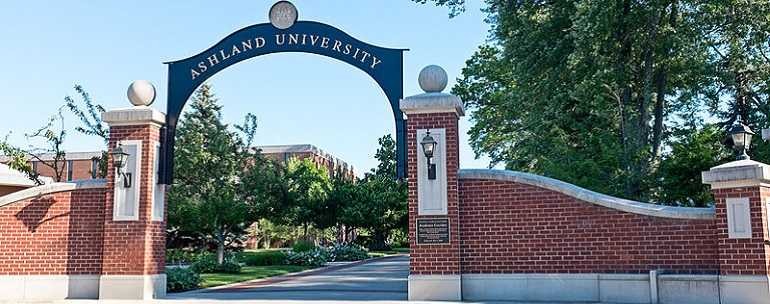
A private university located in Ashland, Ohio, Ashland University is affiliated with the Brethren Church. It also has off-campus centers located in central and northern Ohio. Founded in 1878 as Ashland College, it was renamed Ashland University in 1988. It participates in the NCAA Division II as the Ashland University Eagles.
- MA American History and Government
Ashland University is accredited by The Higher Learning Commission and a member of the North Central Association.
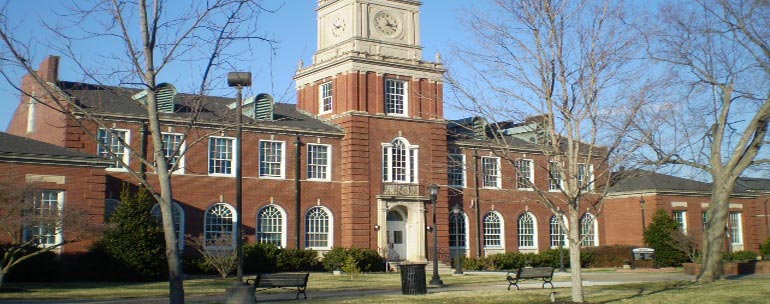
Austin Peay State University in Clarksville, Tennessee is a public university established in 1927. It is named in honor of the former Tennessee governor and Clarksville native. Its intercollegiate athletic teams are also named Governors in honor of Peay.
- Master of Arts in History
Austin Peay State University is accredited by the Southern Association of Colleges and Schools Commission on Colleges to award associate, baccalaureate, master’s, education specialist, and doctorate degrees.
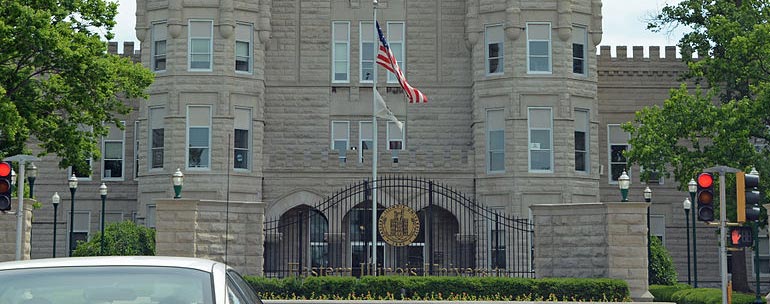
Eastern Illinois University is a public university established in 1895. Originally called the Eastern Illinois State Normal School, it was renamed the Eastern Illinois State Teachers College in 1921, In 1957, it was renamed Eastern Illinois University. Its athletic teams participate in the NCAA Division I as the Eastern Illinois University Panthers.
- Master of Arts in History
Eastern Illinois University is accredited by the Higher Learning Commission of the North Central Association of College and Schools and by the Council for the Accreditation of Educator Preparedness (CAEP).

Online U ranked Fitchburg State University as one of the most affordable colleges for an online Master’s in History program. Students can earn the degree fully online and have the option to attend on-campus institutes during the summer. The program requires the completion of 30 credits and can potentially be completed in just 3 years.
- MA in History
Fitchburg State University is accredited by the New England Commission of Higher Education.
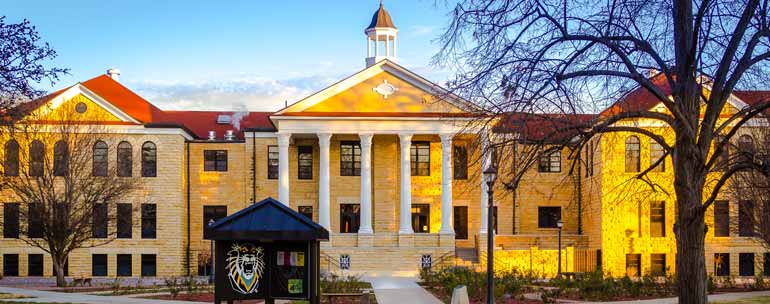
This public university is the third-largest under the governance of the Kansas Board of Regents. It was founded in 1902 as the western branch of the Kansas State Normal School (now Emporia State University). Its intercollegiate athletic teams participate in the NCAA Division II and known as the Fort Hays State Tigers.
- Master of Arts in History
- Master of Arts in Public History
FHSU is regionally accredited by the Higher Learning Commission and is granted the authority to award degrees by the Kansas Board of Regents.

Grand Canyon University is a private Christian university based in Phoenix, Arizona. It is considered the largest Christian university in the world in terms of student enrollment. It was established in 1949 by the Arizona Southern Baptist Convention. Its intercollegiate athletic teams are nicknamed the Antelopes and compete in the NCAA Division I.
- MA in History Education
Grand Canyon University is regionally accredited by the Higher Learning Commission (HLC). According to the HLC, Grand Canyon College entered candidacy for accreditation in 1961.
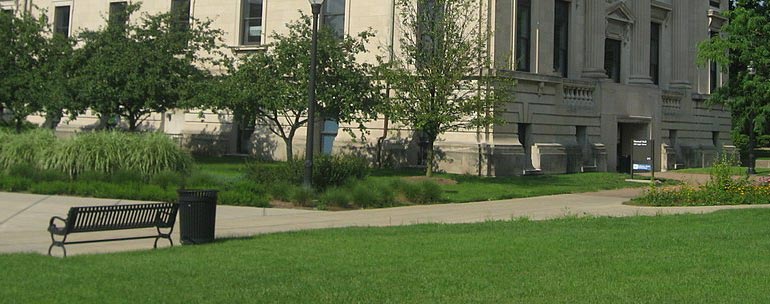
Indiana State University, founded in 1865, is a public university located in Terre Haute, Indiana. It is classified as a doctoral/research university by the Carnegie Classification of Institutions of Higher Education. Its athletic teams, called the Sycamores, participate in the NCAA Division I – Missouri Valley Conference.
- Master of Arts in History
Indiana State University has been accredited by the Higher Learning Commission (HLC) since 1915.

Jackson State University is a public university in Jackson, Mississippi. It is one of the largest historically black universities in the US and the 4th biggest in the state of Mississippi. It was founded in 1877 as Natchez Seminary. It was renamed the Mississippi Negro Training School and then Jackson State College. It was elevated to university status in 1974.
- Master of Arts in History
Jackson State University is accredited by the Commission on Colleges of the Southern Association of Colleges and Schools.
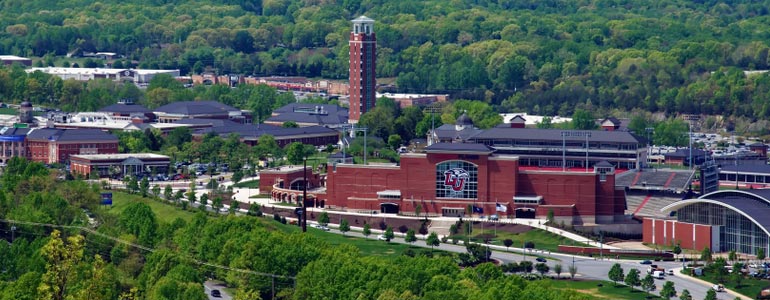
A private evangelical Christian university, Liberty University is one of the biggest Christian universities in the world. Located in Lynchburg, Virginia, it has more than 110,000 enrollees. It is noted for its conservative Christian orientation. Its athletic teams participate in the NCAA Division I and are called the Liberty Flames.
- Master of Arts in History
Liberty University is accredited by the Southern Association of Colleges and Schools Commission on Colleges.
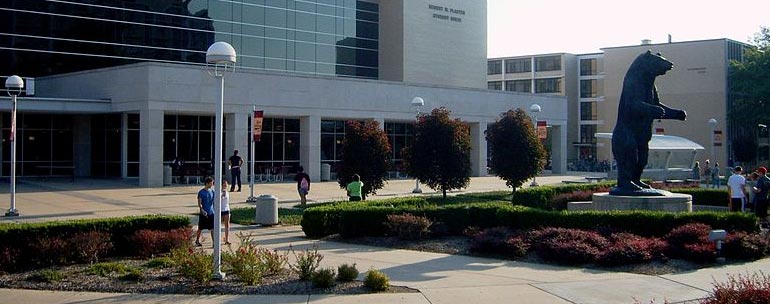
Missouri State University is the second-largest university campus by enrollment in Missouri. It was founded as the Fourth District Normal School in 1905 tasked to prepare teachers for the public school system. Its athletic teams are called the Missouri University Bears and represent the school in the NCAA Division I.
- Master of Arts in History
Missouri State University’s regional accreditation is through the Higher Learning Commission.

National University in La Jolla, California is a private university and flagship university of the National University System. It offers various degree programs in the state and Nevada. It was founded in 1971 by David Chigos.
- Master of Arts in History
Since 1977, National University has been accredited by the WASC Senior College and University Commission (WSCUC).
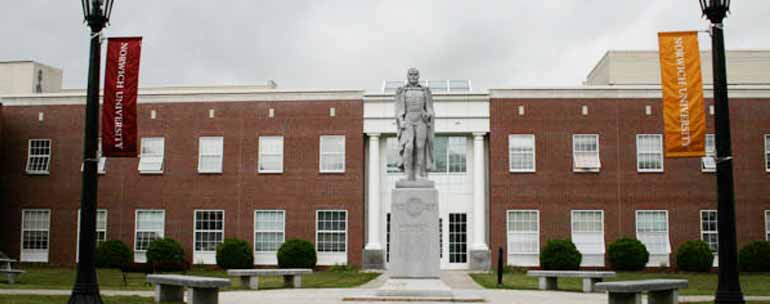
Founded in 1819, Norwich University is the oldest private military college in the country. Established in Norwich, Vermont, it was first known as the American Literary, Scientific, and Military Academy. It is recognized as the Birthplace of the Reserve Officers’ Training Corps by the U.S Department of Defense.
- Master of Arts in History
Norwich University is accredited by the New England Commission of Higher Education.
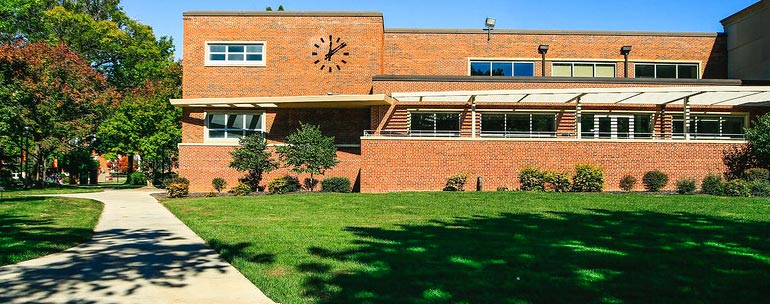
Pittsburg State University is a public university established on March 6, 1903. It was initially a branch of the State Normal School of Emporia before becoming the Kansas State Teachers College of Pittsburg in 1913. It was elevated to university status in 1977.
- Master of History
Pittsburg State University is accredited by the Higher Learning Commission of the North Central Association of Colleges and Schools.
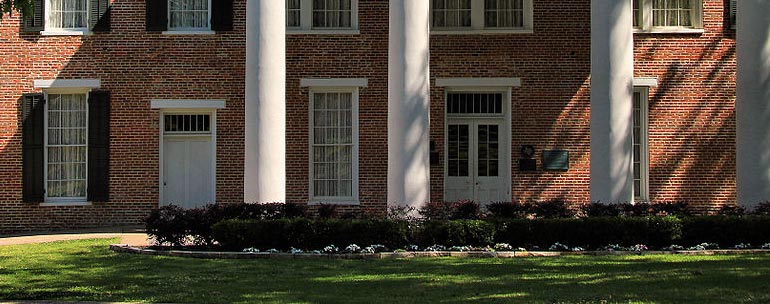
The third oldest public university in Texas, Sam Houston State University is named after the revolutionary leader and politician. Founded in 1879, it was the first institution for teachers residing in the western part of the Mississippi River. Its varsity teams are nicknamed the Bearkats.
- Master of Arts in History
Sam Houston State University is accredited by the Southern Association of Colleges and Schools Commission on Colleges.
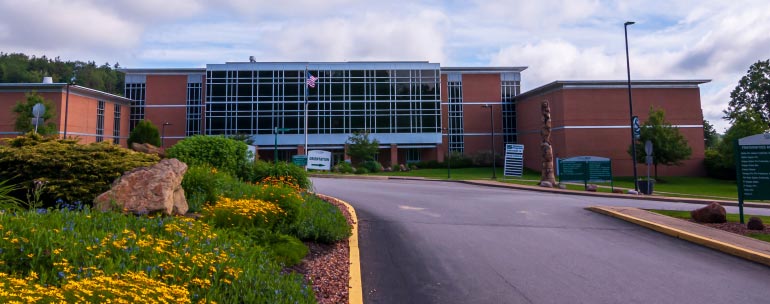
This university is a public, coeducational institution established in 1889. It boasts of having one of the largest campuses in the western part of Pennsylvania. The school is also called “The Rock.” Its varsity teams compete in the NCAA Division II.
- Master of Arts in History
Slippery Rock University is accredited by the Middle States Commission on Higher Education.
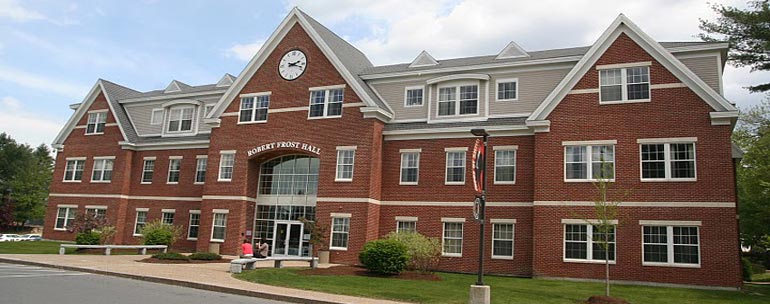
A private university established in 1932, the Southern New Hampshire University is one of the fastest growing in the United States. It is located between Hooksett and Manchester in New Hampshire. Its athletic teams compete in the NCAA Division II as the Penmen.
- Master of Arts in History
Southern New Hampshire University is accredited by the New England Commission of Higher Education (NECHE).
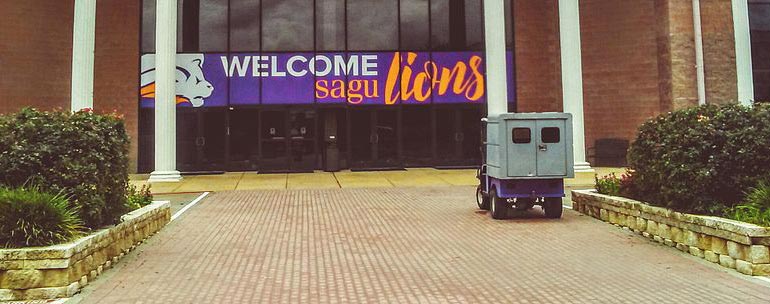
This private Christian university in Waxahachie, Texas was founded in 1927. It is the only university of the religious group Assemblies of God USA in Texas.
- Master of Arts in History
Southwestern Assemblies of God University is accredited by the Southern Association of Colleges and Schools Commission on Colleges (SACSCOC).

UI&U is a private research university in Cincinnati, Ohio that specializes in limited residence and distance learning programs. It is accredited by the Higher Learning Commission and operates satellite campuses in Florida and California.
- Master of Arts in History and Culture
Union Institute and University is accredited by the Higher Learning Commission and operates satellite campuses in Florida and California.
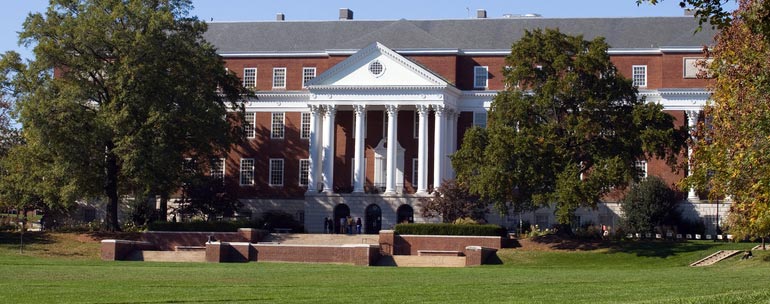
Founded in 1856, the University of Maryland – College Park is the flagship institution of the University System of Maryland. It traces its roots to the Maryland Agricultural College. It is the biggest university in the state of Maryland. It competes in the Big Ten Conference with its teams nicknamed the Maryland Terrapins.
- Master of Professional Studies in Cultural and Heritage Resource Management
The University of Maryland, College Park is accredited by the Middle States Commission on Higher Education (MSCHE), under the authority of the U.S. Department of Education.

The University of Massachusetts Boston (UMass Boston) is the third biggest campus in the University of Massachusetts System. It was founded as the Boston State College in 1852. Its campus is located off Interstate 93. Its athletic teams are known as the Beacons.
- Master of Arts in History
The University of Massachusetts Boston is accredited by the Commission on Institutions of Higher Education of the New England Association of Schools and Colleges, Inc.
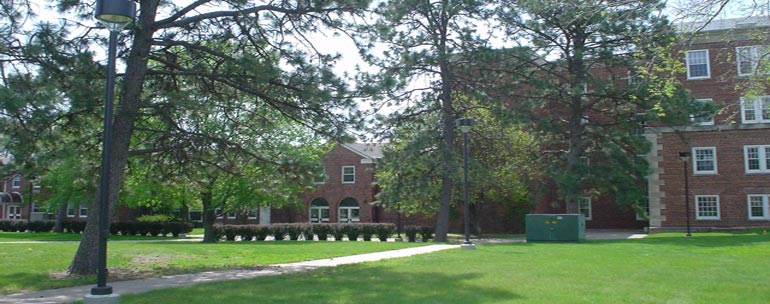
The University of Nebraska at Kearney is a campus of the University of Nebraska System. Located in Kearney, Nebraska, it was established in 1905 and then known as the Nebraska State Normal School at Kearney. Its athletic teams are known as the Lopers.
- Master of Arts in History
The University of Nebraska at Kearney is accredited by the Higher Learning Commission (HLC) and by the Council for the Accreditation of Educator Preparation.
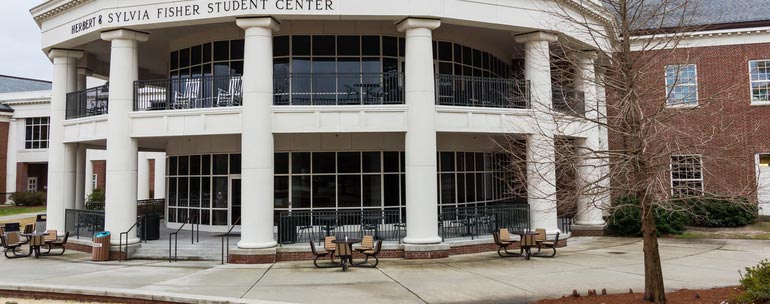
The University of North Carolina Wilmington is a public research university under the University of North Carolina System. It was founded on September 4, 1947 as Wilmington College. In 1969, it was elevated to university status and renamed the University of North Carolina Wilmington. Its athletic teams are known as the Seahawks.
- Master of Arts in History
The University of North Carolina Wilmington is accredited by the Southern Association of Colleges and Schools Commission on Colleges.
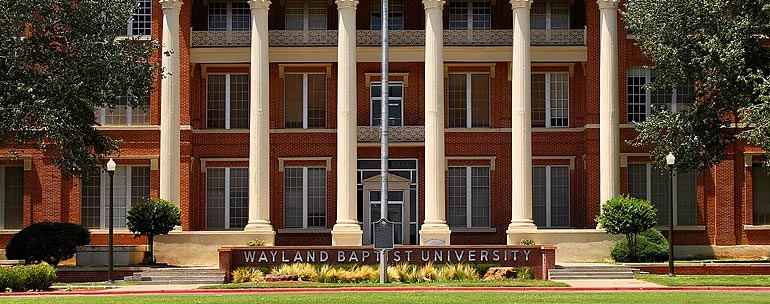
Wayland Baptist University is a private and coeducational institution based in Plainview, Texas. It was chartered on August 31, 1908 as Wayland Literary and Technical Institute before being renamed Wayland Baptist College in 1910. It was elevated to university status in 1981 under its present name.
- Master of Arts in History
Wayland Baptist University is accredited by the Southern Association of Colleges and Schools Commission on Colleges.
There’s No Time Like the Present to Study the Past!

Studying for a master’s in history can allow you to explore a topic that’s fascinating to you and give you the skills to make history accessible to others. Whether you want to be a teacher, a researcher, a sociologist, or an archivist, start exploring history graduate programs online.
Related Guides:

